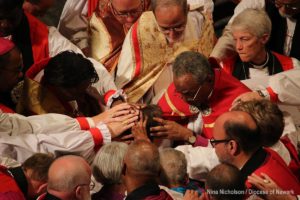 September 23, 2018: May God’s words alone be spoken, may God’s words alone be heard. Amen.
September 23, 2018: May God’s words alone be spoken, may God’s words alone be heard. Amen.
Yesterday, those of us who were able to be at the consecration of our new bishop, now rightfully known to us as the Rt. Rev. Carlye J. Hughes, bore witness to an amazing moment for our church, and particularly for our diocese. Yes, part of that is because she is the first woman, and the first person of color, to ever be elected to the position of bishop diocesan in our diocese. For this, and for her gifts, which we will now experience by God’s grace, we say “Alleluia!” But there is always more to the story.
I love the liturgy of our church, in fact, as you know by now, it is one of the two things that drew me to the Episcopal Church – the other being our strong social justice emphasis. The ordination of a bishop is one of the most beautiful expressions of our traditions, handed down through the centuries, as is also the seating of the bishop at the cathedral, which will take place this afternoon. However, one of the things that might be lost in all of this is what is really taking place, and who the bishop truly is in the life of the church. Yet if we read and inwardly digest the gospel message of today, we will understand ordained life in the church, particularly that of bishops, a bit more.
In the gospel, Jesus is teaching his disciples about what he must undergo, and even as he tries to do this – they were trying to decide among themselves which of them were the top dog. Jesus at this point must have wanted to bang his head against a wall. In fact, Jesus does a face palm a LOT in the gospel of Mark, because the only ones who seem to really get who he is are the demons, the outsiders, and the women. The disciples seem to not have a clue.
And we really see this just before this passage, when the disciples had tried to cast out a demon from a man’s son but failed. For all of his teaching, the disciples seem to think it is all about them – that they would be the ones doing the healing. It’s like that line in the song during the last supper scene in “Jesus Christ Superstar” when the apostles (after having a few glasses of wine) sing “Always thought that I’d be an apostle – knew that I could make it if I tried. Someday we’ll retire and we’ll write the gospels, so they’ll all talk about us when we die.” Yup – about sums it up for these disciples in Mark.
So, Jesus sits them down and tells them bluntly – “Whoever wants to be first must be last of all and servant of all.” But more than that, he brings a child among them and tells them that this child is to be welcomed in his name – and those who do – welcome not only Jesus, but God.
Now, it is hard to imagine how this came across to the disciples given that we have a different view of children today in our society at least. I remember Erma Bombeck writing once, “Do you know what you call those who use towels and never wash them, eat meals and never do the dishes, sit in rooms they never clean, and are entertained till they drop? If you have just answered, “A house guest,” you’re wrong because I have just described my kids.”
But in the ancient near east at the time of Jesus, children were akin to slaves in worth (and it is quite likely that given the hour, this might have been the child of a slave – the lowest of the low). They were not images of innocence and playfulness, but of poverty and powerlessness. And, Jesus sits down – at eye level – with the child – modeling for his disciples the way of life he expects of them.
Jesus is breaking down the assumptions of the disciples about who they are, and what it means to be his followers. Assumptions that were blocking them from being able to live fully into their calling. The disciples thought that being a follower of the Messiah meant that they had privileges – the ability to heal, a special pass into heaven, the best seats at the table. They began to believe that following Christ was a path to privilege, rather than a journey of service.
Jesus calls the child to him to show the disciples truly what it means to follow him, because children can teach us, though most often not in what they say, but in who they are.
There is a story I have told you once (I think) about a mother who was preparing pancakes for her sons, Kevin, who was 5, and Ryan, who was 3. The boys began to argue over who would get the first pancake. Their mother saw the opportunity for a moral lesson. “If Jesus were sitting here, he would say, ‘Let my brother have the first pancake. I can wait.'” Kevin turned to his younger brother and said, “Ryan, you be Jesus!”_
See, I think Jesus was not only using the child as a symbol of the least of these – those we are to serve, but also as a model for our own behavior. That is one of the reasons I so very much love that our primary ministry is our nursery school, and that the largest stained glass window is Jesus with the little children from the gospel of Matthew. Yes, children argue, can be selfish, and want what they want when they want it. Not unlike some folks in our churches, and the rest of society, if we are honest, right? But children are also refreshingly transparent in it all. They are who they are – and they understand that they are dependent on the parent (even if they rebel against it from time to time). Particularly when they are young, they see things in a honest way – clear of the prejudices that we adults feed to them as they grow.
The essayist Francis Thompson once wrote that to be a child is “to believe in love, to believe in loveliness, to believe in belief; it is to be so little that the elves can reach to whisper in your ear; it is to turn pumpkins into coaches, and mice into horses, lowness into loftiness, and nothing into everything, for each child has its fairy godmother in its soul; it is to live in a nutshell and to count yourself the king of infinite space.”
But as adults, we seem to forget all of that. We lose sight of the workings of the Holy Spirit in and around us. We lose sight of who we are as beloved children of God – yes, we are children too! We forget what that means for us, and who we are called to serve. We begin to believe that all that we do is by our own power, and we forget that it is not the path of Jesus to be served, but to serve.
And that is what we come to know about what it means to be a bishop, because while all of us are called to love and serve Christ, the bishop is called to help us all do that, and to model what that means for us.
In the ordination vows we heard yesterday, our Presiding Bishop, the Most Rev. Michael B. Curry, said this as part of what is called The Examination:
“My sister,the people have chosen you and have affirmed
their trust in you by acclaiming your election. A bishop in
God’s holy Church is called to be one with the apostles in
proclaiming Christ’s resurrection and interpreting the Gospel,
and to testify to Christ’s sovereignty as Lord of lords and
King of kings.
You are called to guard the faith, unity, and discipline of the
Church; to celebrate and to provide for the administration of
the sacraments of the New Covenant; to ordain priests and
deacons and to join in ordaining bishops; and to be in all
things a faithful pastor and wholesome example for the
entire flock of Christ.
With your fellow bishops you will share in the leadership of
the Church throughout the world. Your heritage is the faith
of patriarchs, prophets, apostles, and martyrs, and those of
every generation who have looked to God in hope. Your joy
will be to follow him who came, not to be served, but to
serve, and to give his life a ransom for many.”[1]
“Your joy will be to follow him who came, not to be served, but to serve, and to give his life a ransom for many.”
Here we come to see that a bishop is called to be a servant of her people, a model set by Jesus – one we hear him calling his apostles to in this gospel passage.
If that were not clear enough, in the vows for one who is called to this life of bishop, the Presiding Bishop asks:
“As a chief priest and pastor, will you encourage and support all baptized people in their gifts and ministries, nourish them from the riches of God’s grace, pray for them without ceasing, and celebrate with them the sacraments of our redemption?”
And her answer is: “I will, in the name of Christ, the Shepherd and Bishop of our souls.”[2]
Christ as the bishop of our souls.
So you see, a bishop is called to be one with the apostles, whose joy will come from serving as Christ served – the Christ who is the bishop of our souls. And it is this Christ, this Jesus, that is modeling for the apostles who follow him what that life will look like by drawing to his side the child of a servant – the lowest of the low in their society – and telling them that they must be like this one.
So it begs the question then, who are the children Jesus would pull into the center of the room for us today? They are the poor and the homeless, the undocumented, the women, LGBT people, all those on the margins – the ones who differ from the person we see in the mirror. These are the ones Jesus would pull closest to him today, this is who the new bishop will pull closest to her as a model of Christ for us all, as we heard in the final part of her vows where she was asked: “Will you be merciful to all, show compassion to the poor and strangers, and defend those who have no helper?” And her answer was, as it is for all called to this humble role: “I will for the sake of Christ Jesus.”
What will we do for the sake of Christ Jesus?
See, let’s remember the setting of this gospel… the disciples couldn’t seem to do the work of Jesus in the world, and the key to why is found in their fighting over who is the greatest among them. Ordained life is not a rising up the ladder, but an emptying of ego to take on the yolk of Christ’s humility that we might model the life of Jesus for that other order of ministry – the laity – each and every one of you.
To be clear, humility is not self-abasement, it is not dismissing ones talents or abilities, it is not being a doormat for others. Humility is hard work. It takes a lot of effort to drive out the forces that would have us act in ways that do not mirror Jesus. That is why we pray without ceasing, and renew our ordination vows every year. We do this that we may live the life we are called to live – that you might live the life you are called to live.
Bishops model this for us all as they commit to being “one with the apostles.”
All of us too must be “one with the apostles” – the ones who embrace the humble life of service to which Jesus calls all who follow him. In all this we are to remember that we draw closest to him whenever we are closest to those he drew to himself – the ones no one sees, the ones ignored, the ones lost, the ones lonely, the ones we call the least – the children of God who are in pain, who hunger and thirst for love, who live in darkness and despair.
All of us too must remember the vows we have made – our baptismal vows – and live by them as much as is expected for deacons, priests, and bishops to live by theirs. Let us renew those vows now – the answer to each question is: “I will, with God’s help”:
“Celebrant Will you continue in the apostles’ teaching and fellowship, in the breaking of bread, and in the prayers?
People I will, with God’s help.
Celebrant Will you persevere in resisting evil, and, whenever you fall into sin, repent and return to the Lord?
People I will, with God’s help.
Celebrant Will you proclaim by word and example the Good News of God in Christ?
People I will, with God’s help.
Celebrant Will you seek and serve Christ in all persons, loving your neighbor as yourself?
People I will, with God’s help.
Celebrant Will you strive for justice and peace among all people, and respect the dignity of every human being?
People I will, with God’s help.”[3]
You also are called to be “one with the apostles” – the ones Jesus called to welcome the least of these.
“May the Lord who has given you the will to do these things give you the grace and power to perform them.”[4]
Amen.
For the audio from the 10:30am service, click below, or subscribe to our iTunes Sermon Podcast by clicking here:
[1]Book of Common Prayer, p. 517.
[2]Book of Common Prayer, p. 518.
[3]Book of Common Prayer, pg. 304-5.
[4]Book of Common Prayer, pg. 532.
The Rev. Diana L. Wilcox
Christ Church in Bloomfield & Glen Ridge
September 23, 2018
Pentecost 18 – Year B – Track 2
1st Reading – Isaiah 35:4-7a
Psalm 54
2nd Reading –James 3:13-4:3, 7-8a
Gospel – Mark 9:30-37






